Evolution
The almanac is helpful for those who study interdisciplinary macroproblems as well as for specialists working within specific trends, and also for those who to a greater or lesser extent are interested in the evolutionary problems of astrophysics, geology, biology, history, anthropology, linguistics; who long for being familiar with the newest achievements in the humanities, natural and social sciences.
Editors Council: D. Barreiros (Brazil), H. Barry III (USA), Yu. Е. Berezkin (Russia), M. L. Butovskaya (Russia), Ch. Chase-Dunn (USA), V. V. Chernykh (Russia), D. Christian (Australia), S. Gavrilets (USA), А. V. Dybo (Russia), K. Yu. Es'kov (Russia), I. V. Ilyin (Russia), P. Herrmann (Ireland), A. A. Kazankov (Russia), G. G. Malinetsky (Russia), A. V. Markov (Russia), A. Yu. Militarev (Russia), M. V. Mina (Russia), V. de Munck (USA), E. B. Naymark (Russia), A. D. Panov (Russia), Zh. I. Reznikova (Russia), B. H. Rodrigue (USA), P. Skalník (Czech Republic), F. Spier (Netherlands).
• Information for contributors
-
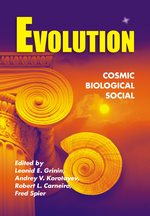
Evolution:
Cosmic, Biological, and SocialThis issue initiates the series of almanac under the common title Evolution, which is supposed to unite researchers working in all fields of evolutionary studies.
• For contributors
• Invitation -

Evolution:
A Big History PerspectiveThe present almanac may be regarded as a collective effort of searching for the contours and specifics of evolutionary megaparadigms.Here the contributions present studies at very large temporal and spatial scales, in other words, the issues of mega- and macroevolution.
-
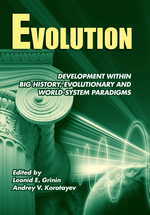
Evolution:
Development within Big History, Evolutionary and World-System ParadigmsThe application of the evolutionary approach to the history of nature and society has remained one of the most effective ways to conceptualize and integrate our growing knowledge of the Universe, life, society and human thought. The present volume demonstrates this in a rather convincing way. This is the third issue of the Almanac series titled ‘Evolution’. The first volume came out with the sub-heading ‘Cosmic, Biological, and Social’, the second was entitled ‘Evolution: A Big History Perspective’.
-

Evolution:
From Big Bang to NanorobotsThe present volume is the fourth issue of the Yearbook series entitled ‘Evolution’. The title of the present volume is ‘From Big Bang to Nanorobots’. In this way we demonstrate that all phases of evolution and Big History are covered in the articles of the present Yearbook. Several articles also present the forecasts about future development.
The main objective of our Yearbook as well as of the previous issues is the creation of a unified interdisciplinary field of research in which the scientists specializing in different disciplines could work within the framework of unified or similar paradigms, using the common terminology and searching for common rules, tendencies and regularities. At the same time for the formation of such an integrated field one should use all available opportunities: theories, laws and methods. In the present volume, a number of such approaches are used. -

Evolution:
Evolution and Big History: Dimensions, Trends, and ForecastsThe present volume is the fifth issue of the ‘Evolution’ Yearbook series. Our Yearbooks are designed to present to its readers the widest possible spectrum of subjects and issues: from universal evolutionism to the analysis of particular evolutionary regularities in the development of biological, abiotic, and social systems, culture, cognition, language, etc. The main objective of our Yearbook is the creation of a unified interdisciplinary field of research, within which scientists specializing in different disciplines could work within the framework of unified or similar paradigms, using common terminology and searching for common rules, tendencies and regularities. Global evolution (in connection with the Big History) becomes the main subject of our Yearbook. We strive to arrange each issue in such a way that the line from cosmic evolution to the human future is evident.
-
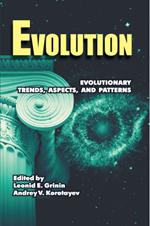
Evolution:
Evolutionary Trends, Aspects, and PatternsThe present volume is the fifth issue of the ‘Evolution’ Yearbook series. Our Yearbooks are designed to present to its readers the widest possible spectrum of subjects and issues: from universal evolutionism to the analysis of particular evolutionary regularities in the development of biological, abiotic, and social systems, culture, cognition, language, etc. The main objective of our Yearbook is the creation of a unified interdisciplinary field of research, within which scientists specializing in different disciplines could work within the framework of unified or similar paradigms, using common terminology and searching for common rules, tendencies and regularities. Global evolution (in connection with the Big History) becomes the main subject of our Yearbook. We strive to arrange each issue in such a way that the line from cosmic evolution to the human future is evident.
-
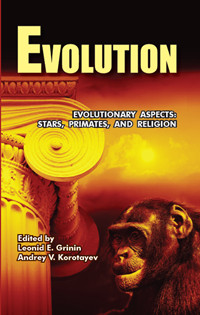
Evolution:
Evolutionary Aspects: Stars, Primates, and ReligionEvery time we work on this Yearbook, we are focused on making at least a small step forward to gradual elaboration of a megaevolutionary paradigm which is designed to create a united scientific field for cross-disciplinary studies.
-
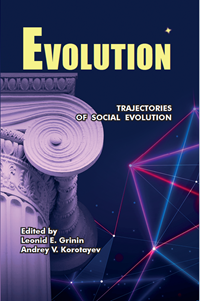
Evolution:
Trajectories of Social EvolutionThe present volume is the eighth issue of the ‘Evolution’ Yearbook series. Our Yearbooks are designed to present to its readers the widest possible spectrum of subjects and issues: from universal evolutionism to the analysis of particular evolutionary regularities in the development of bio-logical, abiotic, and social systems, culture, cognition, language, etc. The main objective of our Yearbook is the creation of a unified interdisciplinary field of research, within which scientists specializing in different disciplines could work within the framework of unified or similar paradigms, using common terminology and searching for common rules, tendencies and regularities. Global evolution (in connection with the Big History) becomes the main subject of our Yearbook. We strive to arrange each issue in such a way that the line from cosmic evolution to the human future is evident. However, in this case we focus only on the social branch of evolution.
-
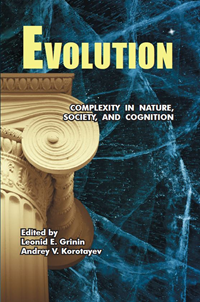
Evolution:
Complexity in Nature, Society, and CognitionThe present volume is the ninth issue of the ‘Evolution’ Yearbook series. Our Yearbooks are designed to present to its readers the widest possible spectrum of subjects and issues: from universal evolutionism to the analysis of particular evolutionary regularities in the development of the Universe, cosmos, stars, and planets, the Earth, chemical, biological, and social systems, culture, cognition, language, etc. Their main objective is the creation of a unified interdisciplinary field of research, within which scientists specializing in different disciplines could work within the framework of unified or similar paradigms, using common terminology and searching for common rules, tendencies and regularities.